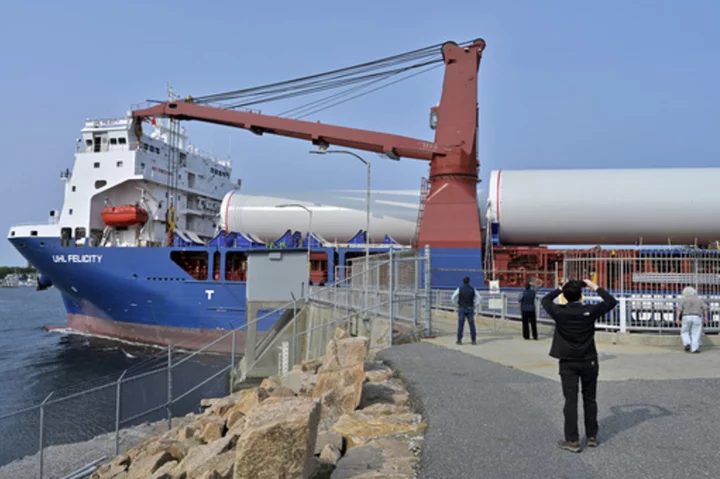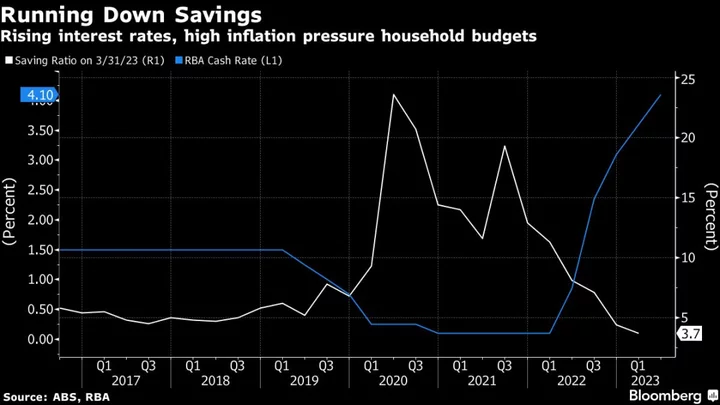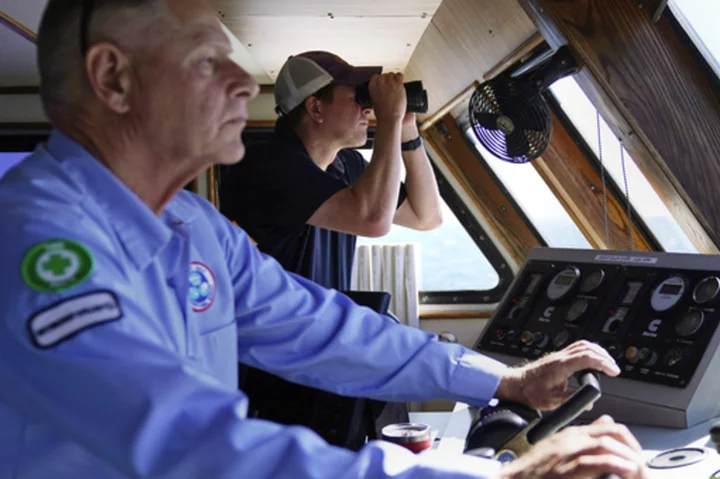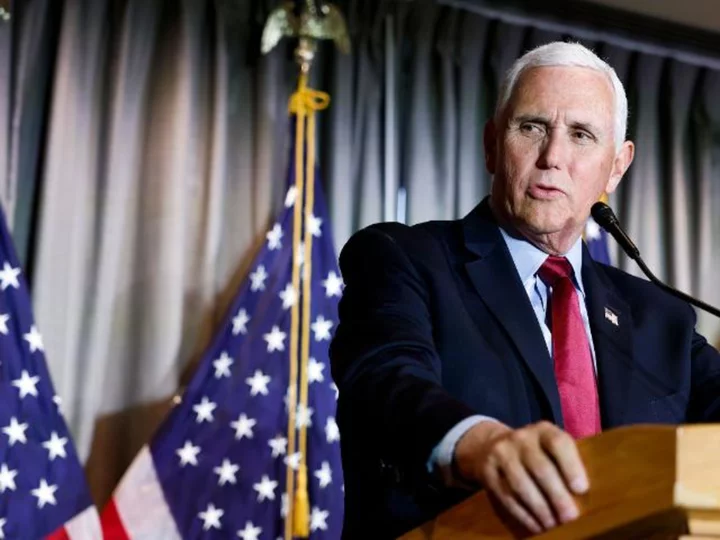NEW BEDFORD, Mass. (AP) — New Bedford was once the city that lit the world, exporting vast quantities of whale oil for lamps in the early 1800s. Workers packed the docks, unloading casks of oil that had been extracted at sea from whale carcasses and brought in by a fleet of hundreds of whaling ships.
More than 170 years later New Bedford aspires to light the world again, in a different relationship with the sea, as the offshore wind industry arrives here.
On Wednesday, a ship bringing wind turbine tower sections from Europe reached New Bedford. Once assembled out on the water this summer by developer Vineyard Wind, the turbines will stand more than 850 feet high.
“There’s this sort of poetic coming-about for New Bedford as a center of energy,” Mayor Jon Mitchell said.
It’s also a milestone for the industry. The United States does not yet have a single commercial-scale offshore wind farm. But it will soon.
THE BUILDOUT
Vineyard Wind is building a 62-turbine wind farm 15 miles (24 kilometers) off the Massachusetts coast. It’s expected to put out 800 megawatts, enough electricity to power more than 400,000 homes, beginning this year. The first U.S. offshore wind farm opened off Rhode Island’s Block Island in late 2016. But with five turbines, it’s not commercial scale.
Another project, South Fork Wind, is scheduled to start construction this summer off the coasts of New York and Rhode Island. Since it’s smaller than Vineyard Wind, it will likely be the first U.S. commercial-scale wind farm to open.
The United States is decades behind Europe, where the world’s first offshore wind farm was erected in 1991. The first U.S. wind farm was supposed to be a project off the coast of Massachusetts known as Cape Wind, but it failed after years of litigation and local opposition.
Vineyard Wind CEO Klaus Skoust Moeller said New Bedford is the cradle of large-scale offshore wind in the United States, and this wind farm sets the stage for the next project, and the next, and the next.
“I’m really looking forward to seeing that first turbine out there in the sunlight,” he said. “For me, that’s a moment of many things coming together.”
The Biden administration wants to build 30 gigawatts of offshore wind energy by 2030. That would be enough to power more than 10 million homes.
The activity is bringing jobs and opportunities for businesses across the country. Developers are investing in multi-million dollar projects to upgrade ports along the East Coast, including New Bedford, New London, Connecticut, Brooklyn, New York and Portsmouth, Virginia. They're planning to invest in ports along the West Coast and on the Gulf Coast as wind farms are approved there.
Billions of dollars will be spent inland too, at shipyards that are building a fleet of specialized vessels to erect and maintain wind farms, according to the American Clean Power Association.
New Bedford saw it coming. Necessity had the city looking for a way forward.
NEW BEDFORD'S NEXT ACT
New Bedford, now a city of about 100,000, is not part of a major metropolitan area. Like similarly situated cities, Mitchell said, they had to figure out how to make their way at a time when the spoils of the American economy are going to the big, superstar cities. The town Herman Melville immortalized in “Moby-Dick” remains a top port for commercial fishing and seafood processing, but the city’s economy can’t depend on just that, he said.
Industrial cities have been burdened with the stigma of being gritty and failing and struggling, Mitchell said. “We eschew all those victimhood labels. So to become a leader in offshore wind, to compete successfully for investment and to grow, it was really an opportunity for us, for our residents, to see our city in a different way, for the rest of the world to see our city in a different way.”
So New Bedford opened the first U.S. port facility specifically designed for offshore wind, in 2015, to become a hub for the industry as it came to the United States, recognizing its promise. Today, Vineyard Wind leases that marine terminal.
Now construction is happening all around the port of New Bedford, more than at any time since the start of the whaling industry, Mitchell said.
Bristol Community College is planning to open a National Offshore Wind Institute in New Bedford late this summer to train and certify workers.
A NEXT ACT FOR PEOPLE, TOO
Ed Gilhouse, a 60-year-old construction safety expert, was at the terminal overseeing the preparations for the ship arrivals. He said he went to work for Vineyard Wind to try something new as his career winds down. It also keeps him close to home. He had been commuting out-of-state to work.
“This is just like a cherry on top for me, so to speak, to be able to do this, to take offshore wind to the next level,” he said. “This is the future.”
Before the turbine tower sections arrived aboard the UHL Felicity, Moeller invited local business and community leaders to the terminal to share their plans for the weeks ahead.
New Bedford native Bernadette Souza went because she wants to be able to tell local students what's happening here. Souza is the executive director of Youth Opportunities Unlimited, which takes students on bike rides along New Bedford’s scenic South End peninsula to introduce them to their everyday surroundings. One of their favorite destinations overlooks the marine terminal.
“They're looking over and they have so many questions,” she said. “I want to get them excited. I love my city. I want to give these kids that opportunity, to say, 'I know about wind. That's where I'm from.'”
___
Associated Press climate and environmental coverage receives support from several private foundations. See more about AP’s climate initiative here. The AP is solely responsible for all content.









